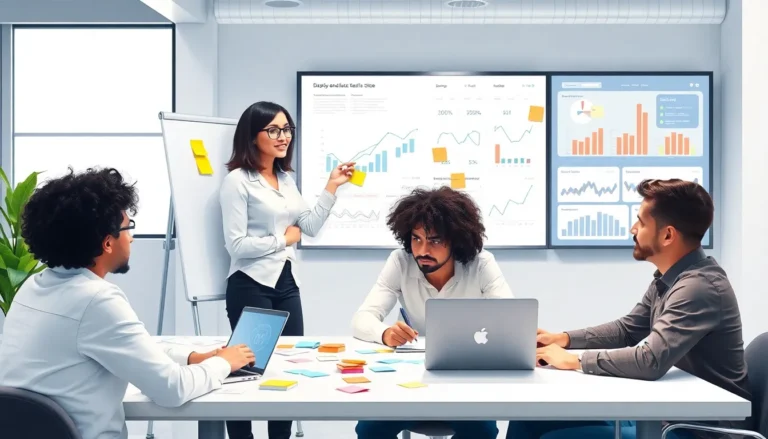Table of Contents
ToggleImagine a world where flying cars aren’t just a dream but a daily commute. Futuristic transformations are reshaping our lives in ways that once belonged in sci-fi novels. From AI assistants that know your coffee preferences better than your best friend to smart homes that can predict when you’ll run out of toilet paper, the future is knocking—and it’s brought along some seriously cool gadgets.
Overview Of Futuristic Transformations
Futuristic transformations encompass a range of advanced technologies that redefine daily experiences. Innovations like flying cars promise to change urban mobility, significantly reducing travel times and congestion. Smart homes, equipped with artificial intelligence and connected devices, improve convenience and enhance energy efficiency.
The integration of robotics in various sectors revolutionizes industries such as healthcare, manufacturing, and logistics. Robots streamline workflows, assisting humans in repetitive tasks while ensuring precision and safety. Augmented reality and virtual reality enhance entertainment and education, allowing immersive experiences that blend digital and physical worlds.
Emerging technologies, including blockchain and quantum computing, offer solutions for security and processing power, respectively. Blockchain enhances data transparency and security, making transactions more efficient and trustworthy. Quantum computing accelerates problem-solving capabilities, which leads to breakthroughs in fields like drug discovery and materials science.
Sustainable technologies also gain traction, promoting cleaner energy sources and reduced carbon footprints. Solar energy systems, electric vehicles, and smart grids contribute to greener living environments, aligning with global sustainability goals. Innovations in agriculture, such as vertical farming and precision agriculture, maximize food production while minimizing waste and resource use.
Transformations in communication, driven by advancements in 5G and satellite internet, enhance connectivity across the globe. High-speed networks support the growing demand for data and seamless communication among devices. As these futuristic elements continue to evolve, they promise a new era of innovation and lifestyle improvements.
Key Areas Of Transformation

Futuristic transformations touch various domains, each with significant implications for daily life. By examining key areas, one can appreciate the depth of these changes.
Technology Innovations
Cutting-edge technologies drive remarkable innovations. Flying cars, once imaginary, are now prototypes transforming urban mobility. AI systems cater to personal preferences, making lives easier. Robotics reshapes industries, enhancing efficiency in manufacturing and healthcare. Augmented and virtual reality provide immersive experiences for entertainment and education. Blockchain secures data with unparalleled integrity, while quantum computing boosts processing capabilities. These advancements offer a glimpse into a seamless, tech-driven future.
Environmental Changes
Sustainable technologies gain momentum, addressing climate change. Solar energy systems harness sunlight, reducing reliance on fossil fuels. Electric vehicles lower emissions, promoting cleaner air. Innovations in energy-efficient buildings contribute to reduced carbon footprints. Smart grids optimize energy use, increasing the stability of power sources. Eco-friendly materials find applications in everyday products, further minimizing environmental impact. Each shift supports the goal of a greener planet.
Societal Shifts
Cultural norms evolve alongside these transformations, redefining lifestyles. Remote work integrates into professional environments, allowing greater flexibility. Education adapts to include digital platforms, enhancing accessibility. Communities become more interconnected through advancements in communication. Social dynamics shift, emphasizing collaboration and innovation. As society embraces these changes, new opportunities for growth emerge in diverse fields. The future presents a landscape rich with potential improvements in daily interactions and business practices.
Impacts On Daily Life
Futuristic transformations are shaping daily life across multiple dimensions. Innovations in work and education significantly influence how individuals engage with their surroundings.
Work And Employment
Remote work becomes standard as technology advances. Automation tools streamline operations, enhancing efficiency across various sectors. Workers adapt to flexible schedules, promoting work-life balance. Collaboration platforms enable teams to connect seamlessly, regardless of physical location. Jobs evolve with a focus on technology and problem-solving skills, making adaptability crucial. Companies prioritize employee wellness, integrating mental health support and flexible working conditions. The gig economy expands, offering diverse opportunities for freelancers and contractors. Overall, these changes redefine traditional employment, fostering a dynamic and responsive work environment.
Education And Learning
Learning methods transform as digital platforms gain traction. Students access vast resources online, empowering independent study. Personalization becomes a primary focus, with adaptive learning systems catering to individual needs. Classrooms integrate virtual reality, creating immersive experiences that bring subjects to life. Teachers leverage technology to enhance engagement, facilitating richer discussions and collaborative projects. Lifelong learning emerges as essential, encouraging individuals to continually update skills in a rapidly shifting job market. Community learning hubs foster collaboration, bridging gaps between formal and informal education. These developments enrich educational experiences, preparing learners for future challenges.
Challenges And Considerations
Futuristic transformations present unique challenges that require thoughtful consideration to ensure beneficial outcomes.
Ethical Implications
Ethical concerns surround the use of emerging technologies. Privacy issues arise as personal data collection increases with AI and smart devices. Bias in algorithms can lead to unfair treatment, making transparency essential. The potential for job displacement due to automation demands proactive measures in workforce retraining. Inclusivity in technology design addresses the needs of diverse populations. Establishing guidelines for responsible AI and robotics usage safeguards against misuse. Collaboration among stakeholders, including policymakers and tech companies, fosters ethical standards in innovation.
Technological Barriers
Technological advancements come with significant barriers that can hinder progress. High costs associated with developing and implementing new technologies often limit access. A lack of infrastructure in many regions constrains deployment of innovations like smart grids. Cybersecurity threats pose risks to data integrity and user trust, necessitating robust security measures. Additionally, skill gaps in the workforce impede the adoption of complex technologies. Ensuring a reliable supply chain for critical resources supports ongoing development. Collaboration between public and private sectors can address these challenges effectively.
The future is brimming with transformative potential that promises to reshape everyday life in unprecedented ways. As technology continues to evolve it opens doors to innovations that enhance convenience and efficiency. From flying cars to smart homes the possibilities are endless.
However the journey towards this futuristic vision requires careful navigation of ethical considerations and practical challenges. By fostering collaboration among stakeholders and embracing responsible technology use society can harness these advancements to create a more inclusive and sustainable world. Embracing change while being mindful of its implications will be key to thriving in this exciting new era.








